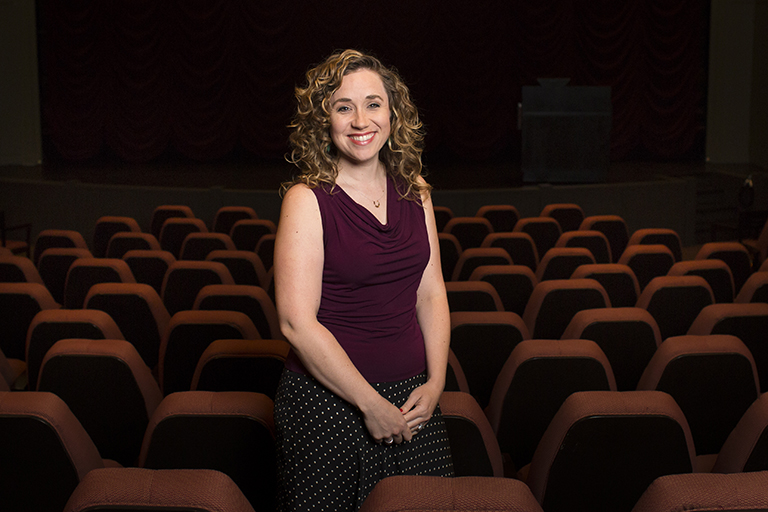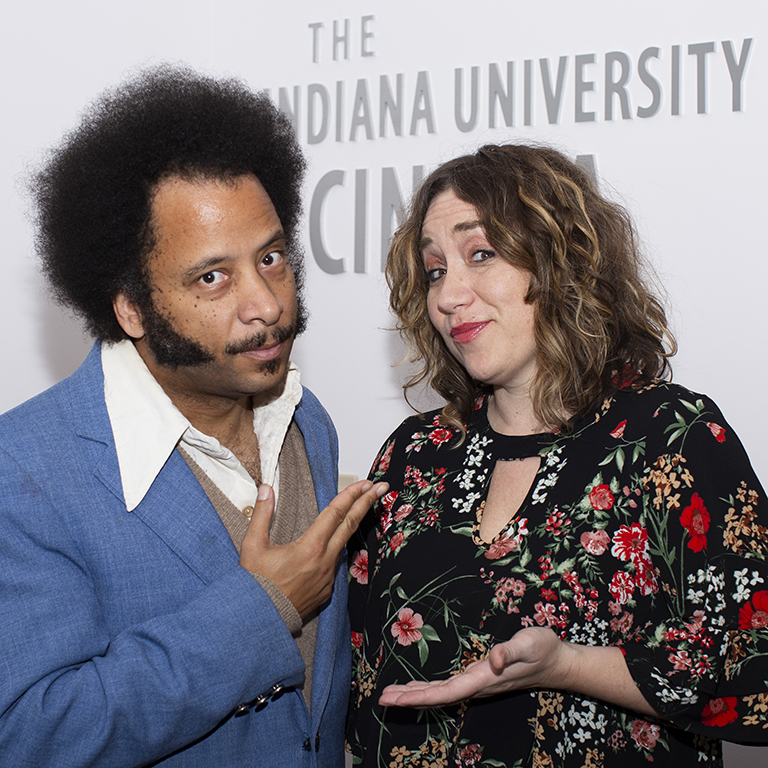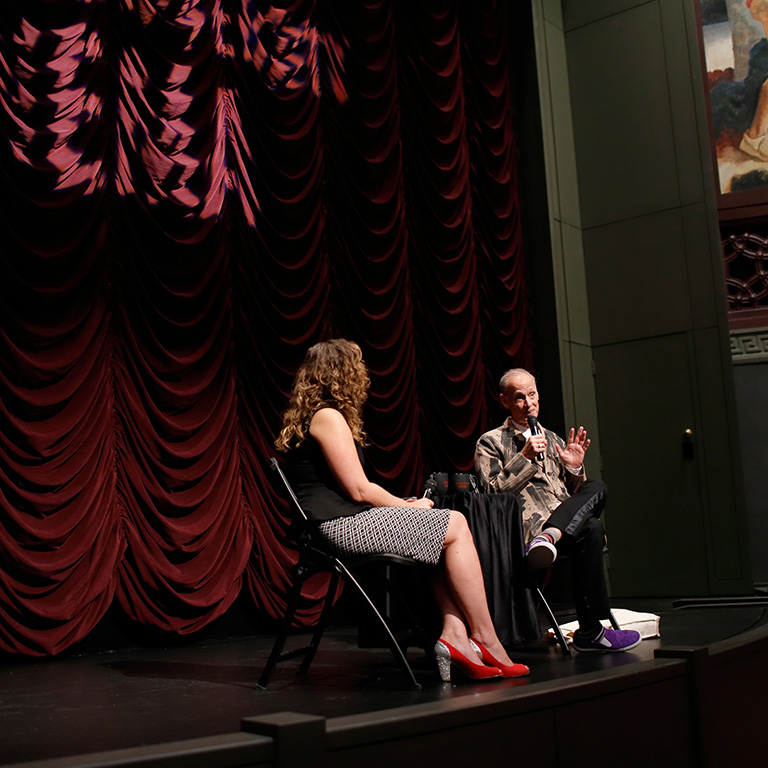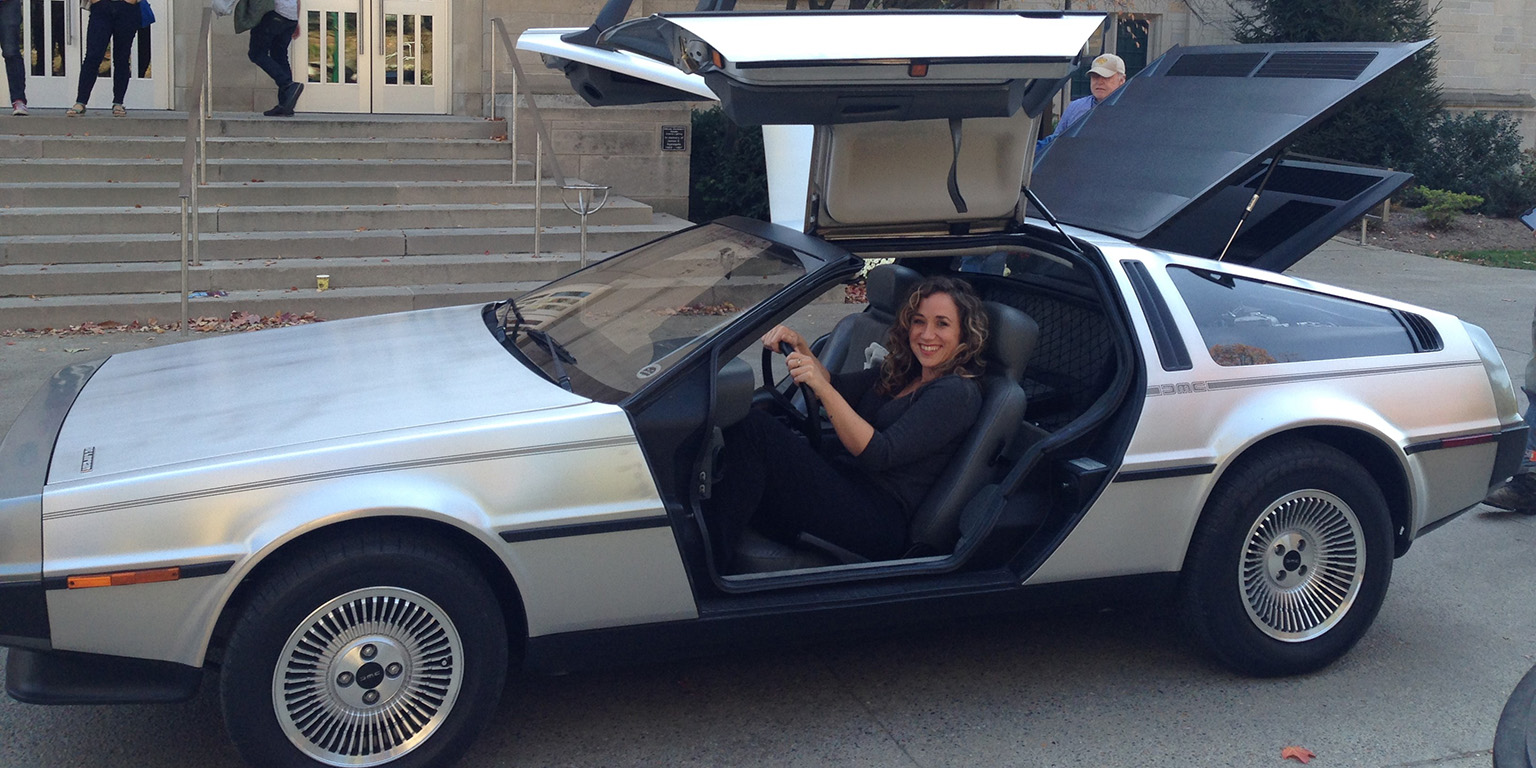January 11, 2021
If you’ve ever seen a movie at IU Cinema, chances are you have also seen Brittany Friesner, interim director of the world-class venue, which celebrates its 10th anniversary this month.
If you’ve ever seen a movie at IU Cinema, chances are you have also seen Brittany Friesner, interim director of the world-class venue, which celebrates its 10th anniversary this month.

In this peaceful limestone oasis in the heart of Indiana University Bloomington’s arts plaza, visitors sink into comfy red velvet chairs surrounded by sections of Thomas Hart Benton’s Indiana Murals for an immersive theatrical experience with some of highest quality film and sound available in the world. In a typical year, IU Cinema hosts more than 250 films and events, including visits with globally acclaimed directors and industry leaders, silent movies accompanied by live orchestras, student-produced shorts, and early releases of award-winning films. (“Parasite” screened there in October 2019, months before its Best Picture Oscar the following March.) Prior to the COVID-19 pandemic, Friesner was frequently onsite for these events, having served as associate director since 2013, welcoming audiences into the space with a deep knowledge and a genuine appreciation for film as an important art form that informs, educates, and inspires.
When the global pandemic hit, IU Cinema quickly adapted to the complicated new reality of virtual screenings, shifting to online programming in early March as it prepared for its first transition in leadership. Friesner officially took over as interim director of IU Cinema Oct. 1, upon the retirement of Jon Vickers, the inaugural director. She previously served as acting director during Vickers’s sabbatical in the 2015–16 academic year. Under her leadership, the cinema space was used this fall for 14 physically distanced classes. (It usually hosts one or two classes per year.) And while the upcoming spring programming will remain largely virtual with the possibility of some outdoor screenings, the offerings are robust; the packed schedule includes films and events postponed from 2020, plus campus and community partnerships represented through the Underground Film Series and Art and a Movie, and a return to the widely popular Staff Selects series, as well as the annual live-music events Double Exposure and the Jon Vickers Scoring Award.
This month also marks the 10th anniversary of IU Cinema’s first-ever public screening. With that milestone in mind, Friesner suggested to Vickers that they co-write a book on how IU Cinema came to be; they worked on it for much of 2020, and “Indiana University Cinema: The New Model,” is now available through IU Press. Learn more about the book and her plans going forward in this From the Desk column.



Top: Friesner in IU Cinema lobby with Boots Riley, Friesner on stage moderating a Q&A with John Waters. Bottom: Friesner in a Delorean outside IU Cinema on Back to the Future Day. Photos courtesy of IU Studios and Brittany Friesner.
As Friesner prepares to lead IU Cinema into its second decade, she answers some burning questions about her personal connection with cinema throughout her life, the differences between the live and virtual film-viewing experience, and the importance of film in conveying the human experience.
Q: Do you remember the first movie you ever saw?
B.F.: I’m not sure I remember the first movie I ever watched, but I do have an early memory of seeing a movie in a theater—when I was four years old, my mother took me to see the 1980 theatrical re-release of “Lady and the Tramp” in a multiplex at a mall. I remember getting extremely upset by Aunt Sarah’s meddling ways and began narrating aloud how mean and rude I thought she was. I vividly recall a young couple giggling at my commentary throughout the rest of the movie. Thankfully, I’ve learned to be much quieter in theaters since then, but I suppose my passion for film was pretty strong from the beginning.
Q: What’s the first movie scene that sticks with you to this day?
B.F.: Well, that’s a funny story. The first scene I thought I was watching when I went to see “The Matrix” for the first time absolutely blew my mind. However, as it turned out, the film was screening in so many theaters of that multiplex that my friend and I walked into the wrong one and proceeded to see the pivotal ending of the movie starting with Morpheus in the rainy skyscraper. D’oh. When the credits began to roll, at first, we were so excited for the film, thinking “well, that’s a hell of a way to start a movie!” Aaaaand, then we realized, we maybe should’ve paid better attention to which theater we entered. That said, I don’t recall it ruining my experience of finally seeing the next showing of the film. And it was so much fun to revisit the trilogy and screen all three films at IU Cinema in the summer of 2019. It sounded and looked amazing on our system.
Q: First movie you owned and re-watched “on tape”?
B.F.: I think the first VHS I ever bought myself (and still own both to this day) was either “The Dark Crystal” or “The Last Unicorn,” both of which I’ve been fortunate enough to program for IU Cinema and had wonderful experiences watching them with our audiences. However, I didn’t know until we screened “The Last Unicorn” that the same core animation team would become the foundation of Hayao Miyazaki’s Studio Ghibli. I guess my taste hasn’t changed much since I was a child. I’ve always been a late adopter as well, so I rented and owned VHS until about 2014. When I lived in Seattle in the early 2000s, I lived a few blocks away from a Blockbuster video store and rented VHS movies so often that I achieved Gold Member status, which was 100+ movies each year. I was pretty dang proud of it and only recently took that membership key fob off of my keychain.
Q: Top movies of each decade of your life thus far?
B.F.: As soon as I answer a question like this, I’m always reminded of a film I forgot to include, so I’ll do my best to list a few I wouldn’t mind being stuck with on a deserted island, but I also know this list would likely be entirely different if you asked me again tomorrow (and every day after).
I’m also including a film from each decade I’d love to screen someday at IU Cinema!
| Deserted Island Films | Love to screen at IU Cinema someday | |
| 1970s | The Godfather Part II | Touki Bouki |
| 1980s | Dirty Dancing | Top Gun |
| 1990s | Princess Mononoke | Ratcatcher |
| 2000s | The Lives of Others | Infernal Affairs Trilogy |
| 2010s | Arrival | Magic Mike XXL |
| 2020s | Nomadland | Night of the Kings |
Q: How important is the live theater experience compared with streaming movies at home or on devices?
B.F.: I think all forms of experiencing film have their place, truly. There are some films I would highly prefer to watch at home, alone, especially those that might be particularly moving or difficult or that I will need some time to unpack and maybe even re-watch right away. There are movies I absolutely insist on seeing opening weekend in the theater so I can experience being immersed in a packed house—the thrill of anticipation, the communal jump scare, the simultaneous eruption of applause or laughter or disgust. Since the start of the pandemic, I’ve curated *a weekly remote movie party with my friends, and it’s not even really about the films; it’s about giving us a forum to connect, to still feel a sense of gathering, even when we are all sitting alone in our homes. So, I absolutely respect anyone fighting to keep the communal film-going experience alive and well, but I think that experience is one of many ways to experience film, and all have their value. *(In case you’re curious about the films: they watched Die Hard together Christmas Day and worked their way through a mixture of additional films, including some cult classics they could chat through: Okja, Safety Not Guaranteed, Starship Troopers, Raising Arizona, Tucker & Dale VS. Evil, Ghost Rider.)
Q: If public health significantly changes the way people write, film, produce, and watch movies, what do you anticipate being the next wave of cinema, if you had to guess?
B.F.: I don’t really have a good answer to this, but what I can say is we’ve been seeing many films that were on the festival circuit in 2018, 2019, and even early in 2020, that are now getting a second look by distributors and being released in virtual cinema—films that were originally screened in festivals, but never secured theatrical distribution are getting a new life. I love this. So many films screen at festivals, and so many smaller works by emerging or independent filmmakers, especially international works, never break out of their festival runs. This is where I am always looking for gems to program that might not get a wide theatrical release and never make it to the audiences who will fall in love with them. I’m so happy these kinds of films, the kind we hope our audiences will take a chance on, are becoming easier and easier to book in our virtual offerings.
Q: During your time with IU Cinema, what have you learned about filmmaking? What moments, festivals, or filmmaker interactions are personal highlights?
B.F.: Throughout my time working at IU Cinema, I’ve learned there are approximately eleventy billion ways to make movies. It’s remarkable how different the journey to filmmaking can be, and I love that our guests are so generous with our audiences in sharing their stories. One piece of advice I’ve noticed many filmmakers offer to those who might want to make movies is: do not to wait for permission. Just start moving movies—with your friends, by yourself, however you do it, just make movies. Personal highlights of some of the filmmakers I’ve hosted and interacted with include: John Waters, Penelope Spheeris, Ash Mayfair, Isabel Sandoval, Tony Buba, Joseph Bernard, Josephine Decker, Numa Perrier, Boots Riley.
Q: What can films teach us about ourselves and each other?
B.F.: Everything, and I don’t say that to be trite. What I love about film is it can teach us about so many experiences we’ll never have, realities we’ll never know. It can provide us a richer emotional life, and, I hope, help us all become more empathetic. Through film, we can learn not only a little about these worlds, these histories, these inner lives we’ll never know or experience, but we can also have our eyes and hearts opened to a deeper understanding of how limited in scope our worldview can be at times. I think we can also learn that no matter how different we may appear to be on the surface, there are many, many similarities we all experience as human beings and, hopefully, we can see there is much more that connects us than should divide us.